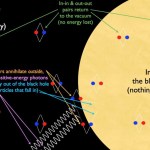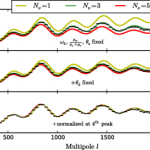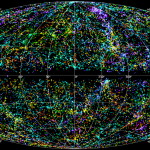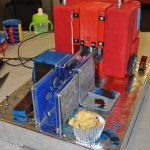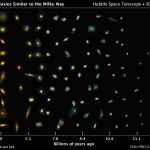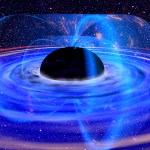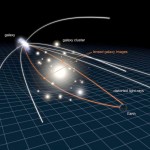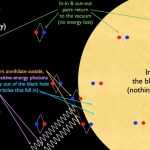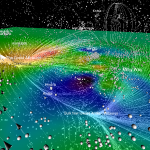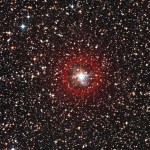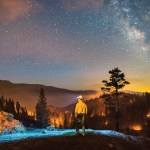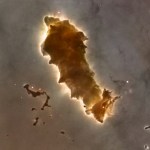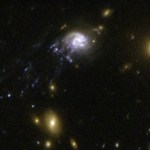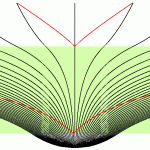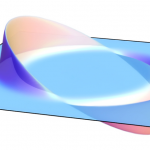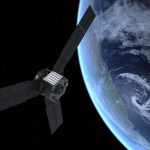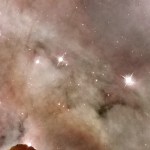
“I was strongly encouraged by a science teacher who took an interest in me and presented me with a key to the laboratory to allow me to work whenever I wanted.” -Frederick Reines, discoverer of the first neutrino
That kind of education is irreplaceable, and at Starts With A Bang we do our best to bring the stories, knowledge and wonder of the Universe to everyone. Here's a look back at what we hit on this past week:
Have we solved the black hole information paradox? (for Ask Ethan),
The ultimate superhero cake (for our Weekend Diversion),
See inside the swirling storms of…
“There is a fifth dimension, beyond that which is known to man. It is a dimension as vast as space and as timeless as infinity. It is the middle ground between light and shadow, between science and superstition.” -Rod Serling
Of course, despite our best theoretical hopes, we know only of four dimensions -- three space and one time -- that exist in our Universe. But what if there not only were a fourth spatial dimension, but it presented itself to us by growing from a microscopic, undetectable state, and then shrank back into one on an annual basis?
Image credit: Paul Falstad’s 3-D…
“One life is all we have and we live it as we believe in living it. But to sacrifice what you are and to live without belief, that is a fate more terrible than dying.” –Joan of Arc
In 2012, I had the honor and the privilege to learn about Mariam Sultana, the first woman in Pakistan to be awarded a Ph.D. degree in astrophysics. Thanks to the wonders of the internet, I was able to contact her and obtain permission for an exclusive interview, for which I solicited questions for her from all over the globe.
Image credit: The Express Tribune with the International Herald Tribune, http://tribune.…
“When you see how fragile and delicate life can be, all else fades into the background.” -Jenna Morasca
The hot Big Bang -- proposed seventy years ago -- is a tremendous success story. Predicated on the assumption that the Universe was hotter, denser, more uniform and expanding faster in the past, it's allowed us to predict the rate of cosmic expansion over distance and time, the primeval abundances of the light elements, the formation and evolution of large-scale-structure, and the existence and properties of the cosmic microwave background: the leftover photon glow from the Big Bang.
Image…
When it comes to the Universe, physicists say things like: it originated in a Big Bang, it's isotropic (or the same in all directions), and it's homogeneous (the same everywhere), save for the effects of cosmic evolution. In every direction we look, we see galaxies expanding away from us, with the expansion rate increasing the farther away we look.
Image credit: NASA / WMAP science team, via http://map.gsfc.nasa.gov/universe/bb_tests_exp.html.
But an expansion inherent to the fabric of space itself isn't the only explanation; it's conceivable that we see what we see because everything…
“It is marvelous indeed to watch on television the rings of Saturn close; and to speculate on what we may yet find at galaxy’s edge. But in the process, we have lost the human element; not to mention the high hope of those quaint days when flight would create ‘one world.’ Instead of one world, we have ‘star wars,’ and a future in which dumb dented human toys will drift mindlessly about the cosmos long after our small planet’s dead.” -Gore Vidal
And yet, it isn't just the rings of Saturn that fascinate us, nor can we simply "watch them on television," as Gore Vidal sadly declared. Every…
“When he came home, I could see a change. He was quieter and he was a man and a hero to me. I watched him and listened to him. I’d never had an opportunity to do a superhero, and when that came, [that voice] just came right out of me and I sounded like Optimus.” -Peter Cullen, on his brother
If you were a kid in the mid-to-late 1980s, you couldn't have missed the phenomenon of Transformers, and if you were a kid again in the late 2000s/early 2010s, you had another chance to become enamored of these multi-formed giant robots. Have a listen to Tracy Chapman’s reflective and provocative…
“To me there has never been a higher source of earthly honor or distinction than that connected with advances in science.” -Isaac Newton
And the advances continue, not just here at Starts With A Bang but everywhere humans are engaged in the practice of gathering knowledge about the world and Universe itself. This past week, we covered:
Is everything in the Universe the same age? (for Ask Ethan),
The horror and beauty of California's wildfires (for our Weekend Diversion),
A pulsing cosmic echo (for Mostly Mute Monday),
How fast are we moving through space?,
10…
“Thus it seems Einstein was doubly wrong when he said, God does not play dice. Not only does God definitely play dice, but He sometimes confuses us by throwing them where they can’t be seen.” -Stephen Hawking
You've no doubt heard that Stephen Hawking is claiming that the black hole information paradox has now been resolved, with the information encoded on the event horizon and then onto the outgoing radiation via a new mechanism that he'll detail in a paper due out next month, along with collaborators Malcom Perry and Andrew Strominger.
Image credit: TU Wien.
Only, that's not really what'…
“When I say, ‘I love you,’ it’s not because I want you or because I can’t have you. It has nothing to do with me. I love what you are, what you do, how you try. I’ve seen your kindness and your strength. I’ve seen the best and the worst of you. And I understand with perfect clarity exactly what you are.” –Joss Whedon
When you first venture out into the world, you're armed, as a human being, with an incredible intelligence, but with no experience. All sorts of basic things must be learned, often the hard way: hot things will burn you, hot things that don't look hot will also burn you, and that…
Earlier this week, Stephen Hawking shook up the world when he announced that he had uncovered the solution to the black hole information paradox at a conference in Stockholm. When particles fall into (or create) a black hole, information is encoded on the black hole's surface, but when the black hole decays into radiation, that information appears to be lost, as the radiation is thermal.
Image credit: E. Siegel.
But perhaps the information is stored on the event horizon, and can be encoded into the outgoing radiation thanks to the interplay of gravitation and matter. Details should be…
“The slow philosophy is not about doing everything in tortoise mode. It’s less about the speed and more about investing the right amount of time and attention in the problem so you solve it.” -Carl Honore
If you wanted to know how fast you were moving through space, you'd need to measure it all: the Earth's rotation, our motion around the Sun, the Sun's motion through the galaxy, the Milky Way's speed within the local group, and finally how the local group moved relative to the Universe. All in all, it's a daunting, virtually impossible task without literally measuring everything in the…
“What is history? An echo of the past in the future; a reflex from the future on the past.” -Victor Hugo
When stars are born of a certain mass -- between about 10 and 40 times the mass of the Sun -- they can evolve into yellow supergiants when they burn through the hydrogen in their cores. As the outer layers expand, cool, contract, heat up, and pulse in this fashion, they can occasionally be blown off to form a gaseous cloud surrounding the star.
Image credit: ESA/Hubble & ESO.
These Cepheid variable stars have been known and studied for over a hundred years, and vary tremendously in…
“the way to create art is to burn and destroy
ordinary concepts and to substitute them
with new truths that run down from the top of the head
and out of the heart” -Charles Bukowski
When it comes to destructive forces that are also mesmerizing and impossible to look away from, it's hard to compete with fire. Have a listen to Josh Ritter sing about one of the most common, destructive types,
Wildfires,
but consider that there's often a beauty to the destruction that's rarely captures.
Image credit: Stuart Palley, from his instagram feed at https://instagram.com/stuartpalley/.
Photographer…
"Once you accept that we're all imperfect, it's the most liberating thing in the world. Then you can go around making mistakes and saying the wrong thing and tripping over on the street and all that and not feel worried." -Paloma Faith
Yet it's the imperfections in the Universe that truly enable the most interesting things within it to exist at all. We covered just a smattering of them here at Starts With A Bang this past week, including:
Did the Universe need to be born "lumpy" (for Ask Ethan),
Work out to the Maxx (for our Weekend Diversion),
Inside the Carina Nebula (…
“The total number of people who understand relativistic time, even after eighty years since the advent of special relativity, is still much smaller than the number of people who believe in horoscopes.” -Yuval Ne’eman
It's been 13.8 billion years since the Big Bang for us, and when we look out at a distant object in the Universe, we're seeing it as it was in the past. Its age -- as it appears -- is determined only by how long the light took for it to travel from that object to our eyes, but to someone living there, it will also appear that the Universe is 13.8 billion years old.
Image credit…
“Despite its name, the big bang theory is not really a theory of a bang at all. It is really only a theory of the aftermath of a bang.” –Alan Guth
If we trace the evolution of our Universe back in time, we can arrive at a time before there were organic molecules, rocky planets, heavy elements, galaxies, stars, or even neutral atoms. The farther back we go, the hotter the Universe gets, the higher in density and temperature, and more uniform. But at some point, this hot, dense, expanding state ceases to describe our Universe.
Image credit: Lawrence Berkeley National Laboratory.
Because…
“‘Star Trek’ says that it has not all happened, it has not all been discovered, that tomorrow can be as challenging and adventurous as any time man has ever lived.” -Gene Roddenberry
Today would have been the 95th birthday of Gene Roddenberry, the mind that brought us the Universe of Star Trek. In addition to a utopia where maladies like hunger, disease and poverty were eradicated, Star Trek promised a future where technology was widely available and sufficiently advanced to the benefit of all of humanity.
Image credit: ©2015 KGO-TV, of the “Scanadu” medical tricorder.
While many of these…
Every time you follow the motion of a spacecraft, moon, planet or other object through the Solar System, you're putting the theory of gravity to the test. On one hand, there's a robust set of predictions for what the behavioral motion of these bodies ought to be, while on the other there's what we actually observe. Sometimes, a mismatch indicates the need for something new, like a new planet or a new law of gravity.
Image credit: Sky & Telescope.
But other times, there are mundane explanations that account for these "apparent" discrepancies, such as radioactive decay, heating from…
“This method of viewing the heavens seems to throw them into a new kind of light. They are now seen to resemble a luxuriant garden, which contains the greatest variety of productions, in different flourishing beds; and one advantage we may reap from it is, that we can, as it were, extend the range of our experience to an immense duration.” -William Herschel
When a large molecular cloud of gas begins to collapse under its own gravity, whether spontaneously or triggered by a "nudge" in space, the runaway process leads to many new star clusters, which in turn lead to ionization, ultraviolet…
